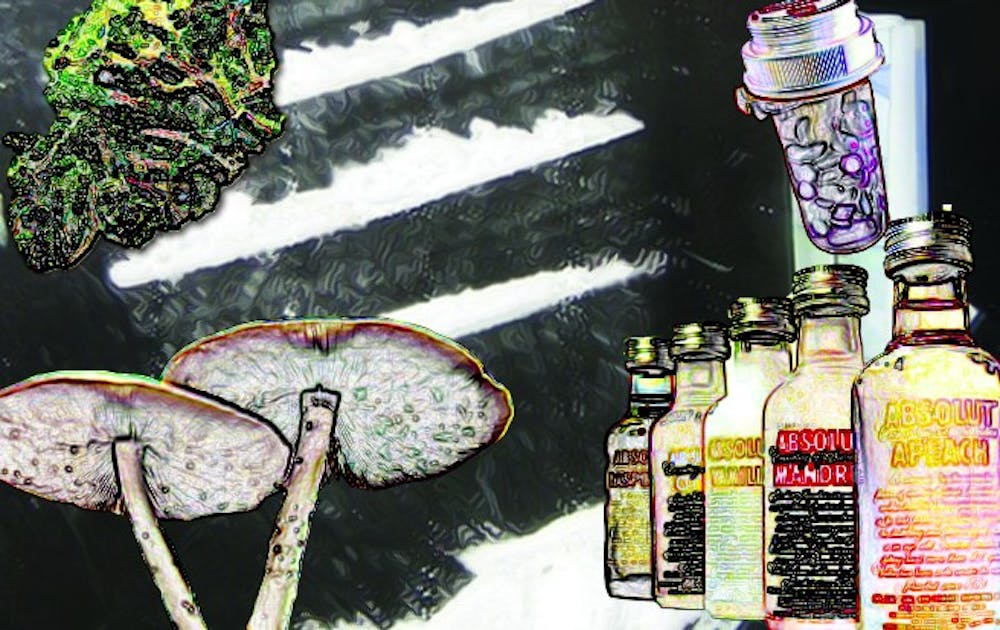From the ages of 18 to 25, substance abuse occurs because of a period of freedom and lack of concrete obligations, according to psychologist Jeffrey Arnett.
Arnett, a research professor of psychology at Clark University, spoke to about 50 professors, researchers and graduate students Thursday at the Sanford School of Public Policy about his research on the timeline of substance abuse and its peak in early adulthood, which involved interviewing 300 Americans from ages 18-29. During emerging adulthood—a term coined by Arnett to describe the time from age 18 through a person’s twenties—five features distinguish and dictate the decisions a person makes about substance use. These include identity exploration, instability, self-focusing, feeling in-between and anticipating the possibilities that will determine the outcome of the rest of life.
“You should be doing extreme things, because you’ll have good stories to tell,” he said. “It’s a fun and exciting time when they should be allowed to do exciting things, but that may include substance abuse.”
According to Arnett’s research, binge drinking peaks from the ages of 18 to 22. Other forms of drug abuse were also at their high during that age range. Arnett explained this by suggesting that emerging adults have instability in their jobs, relationships and residence, much of which is involuntary and usually not as prominent later or earlier in life. This variance can cause a stressful or anxious time period in which people self-medicate with drugs or alcohol.
At that age, people tend to focus on developing themselves and experimenting with their identity before becoming responsible for others. The freedom that comes with emerging adulthood—in between adolescence and the responsibilities of being an adult—leads people to try more dangerous activities, such as binge drinking.
Despite the fact that some of the age range’s negative qualities may lead to alcohol or drug abuse, Arnett noted that a remarkable optimism accompanies these same qualities. Arnett found that 89 percent of those interviewed said that they were confident that they will get what they want out of life.
“It’s marvelous, it’s admirable and it’s worrisome,” Arnett said, drawing laughter from the crowd of mostly middle-aged scholars. “All of us who are older and wiser know that life is not that benevolent.”
Arnett attributed this confidence to a concept he “loves” called optimistic bias— the idea that people believe bad things are more likely to happen to other people than themselves. For example, Arnett said, many smokers believe that the negative consequences will not affect them, just others.
Arnett also noted that though the results of his research pertain mostly to people in developed countries, citizens of developing nations may undergo similar coming-of-age experiences. There is still a level of variation, however, in the symptoms of emerging adulthood in both developing countries and the United States.
“They’re not universal or uniform,” Arnett said. “They don’t occur in the same way everywhere. Adolescence is a privilege.”
Megan Golonka, a graduate student in psychology and neuroscience who attended the lecture, said she agrees with Arnett that the problems and causes of substance abuse are valid but not the same across all cultures.
“It’s a luxury developing into adulthood,” Golonka said. “The opportunities certainly diminish in third world countries. [The progression into adulthood] is a reflection of the society.”
Arnett concluded his presentation with a positive comparison of the present generation to the one before it. Despite the prevalence of substance abuse among emerging adults, it is still lower and accompanies decreased sexual abuse, automobile risk and crime rates than it did about 20 years ago.
“When you’re young, you can do certain things you are not allowed to do later,” he said. “Trying out new experiences, engaging in identity explorations—there are a whole lot of things you can do just to see what they are like. You are only young once.”
Get The Chronicle straight to your inbox
Signup for our weekly newsletter. Cancel at any time.

